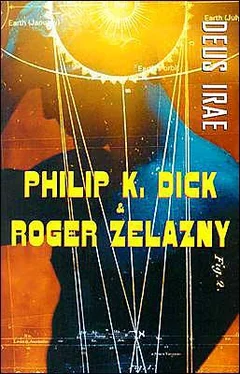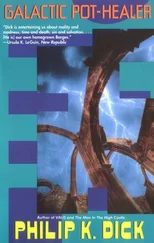As they descended, the bird prattled on, telling of the strange and frightening—and fascinating—altereds that had been born in the area during the past few years. Tibor barely listened; the rough jolting of the cart, its front right wheel stuck, made him ill; he shut his eyes, and, trying to relax, prayed for relief from his nausea. Part of it, he realized, is fear… my fear at showing up in New Brunswick, a place I have never been before. What will it be like, finding myself surrounded by strangers? What if I can’t understand, and they can’t understand me? And then he thought, New Brunswick. Maybe he would find someone who still remembered German. That would help, if the tongue hadn’t evolved—or devolved—too far.
Blithely, the blue jay described various altereds he had seen during his life. “—And some have a single eye in the center of then: head. Cyclopism, I believe it’s called. And with others, when they are born, their hide is cracked and dried and sprouting a heavy coat of dark, coarse fur that covers the baby. And then there was one where its fingers came out of its chest; it had no arms, just like you. And no legs. Just the fingers protruding from the ribcage. It lived almost a year, I understand.”
“Could it wiggle the fingers?” Tibor asked.
“It made obscene gestures from tune to time. But no one was really sure that it was intentional.”
Tibor roused himself from his retracted state. “Were there any more types that you can remember?” Now and then the subject morbidly fascinated him, perhaps because of his own problem. “What about geryons? Any of them, the three-in-ones?”
“I have seen geryon three-in-ones,” the bird said. “But not at New Brunswick. Farther to the north where more radiation drifted. And in addition I saw one time a human ostrich… that is, long spindly legs, a feathered body, then naked neck up to—”
“That’s enough,” Tibor said, too unwell to listen to any more.
The bird cackled, “Let me tell you the best I’ve ever seen, in all the places I’ve ever been. It consists of an external brain which is carried in a bucket or jar, still functioning, with a dense Saran Wrap to protect it from the atmosphere and to keep the blood from draining off. And the owner had to constantly watch it, to see if it hadn’t been dealt a traumatic jolt. That one lived indefinitely, but his whole life was spent in—”
“No more,” Tibor managed. His nausea had won out over his morbid interest; he again closed his eyes and settled back against the seat behind him.
They continued on in silence.
All at once the seized-up front right wheel of the cart came off. It rolled away and disappeared below them; the cart came to a sudden stop as the cow halted, aware that its burden had undergone a fundamental alteration.
Tibor said thick-tonguedly, “Well, that ends it all for me.” He had anticipated this off and on during his life, and on this Pilg he particularly felt its closeness. Worry had become a doorway to the real, all at once; it had been an irrational fear that actually worked itself out in reality. He felt animal terror, as if he had been caught in a trap, by his foot—if he had had a foot. The animal gnaws its leg off, he thought in overwhelming panic, to get away. But there’s nothing I can do. I have no leg to gnaw off; there’s nothing I can do to save myself.
“I’ll get help,” the bird said. “Except—” It flew down and came to rest on Tiber’s shoulder. “You’re the only one who can understand me. Write a note and I’ll deliver it.”
With his right manual extensor Tibor got out a black-leather notebook and ballpoint pen. He wrote: “I, Tibor McMasters, an incomplete, am trapped on the hillside in my ruined cart. Follow the bird.”
“Okay,” he said; he folded the paper and held it up. The blue jay seized it with his beak, and then, pumping himself up into the warm morning air, he streaked off, toward the valley below and its human—or near-human—inhabitants.
Silence.
Maybe I’ll never move forward again, Tibor said to himself. My grave, here. The tomb for my ambitions. Or rather, the ambitions of others operating through me. Yes, my ambitions, too, he realized. I didn’t have to come here; I knew the dangers and yet I came here. So it’s really my fault. To come here and die, so close to what I’m seeking for. Assuming that this was the right place to come.
“Screw it,” he said aloud.
The cow turned questioningly. Savagely he flicked at it with his pseudowhip. The cow mooed and tried to walk ahead. But the front axle dug deep into the ground and brought the forward motion to an abrupt halt. All I can do is wait, he realized. If the bird doesn’t come back, or doesn’t bring someone with it, then I’m dead. Here in this ordinary spot. I journeyed here to die. And the God of Wrath will never be found… at least not by me.
And now what? he asked himself. He examined his watch; the time was nine-thirty. If they’re coming at all they should be here by eleven, he decided. If they’re not here by then—
Then, he thought, I will give up.
“I would have liked to see a geryon,” he said aloud, as if to the cow. Maybe I ought to let you go, he pondered. No; if they do come with help I will need you.
“ ‘Cow, cow,’ “ he quoted. “ ‘I and thou.’ “ He would have liked to go on with the James Stephens poem, but he could not remember any more. ‘Looking in each other’s eyes?’ Was that it?
How banal, he thought.
Strange, he thought, how at crucial and unfortunate times one relies not on great poetry but on doggerel. ‘When that one great scorer comes to total up your name it’s not whether you won or lost but how you played the game.’ That’s it, he realized. Poetry, even great poetry, couldn’t be any better.
I’ve played the game with honesty and skill, he informed himself.
“ ‘If wishes were horses then beggars might ride,’ “ he quoted aloud. Silence, except for the breathing of himself and the cow—the animal still strained to reach some lush weeds not far off. “You’re hungry,” he said to her. So am I, he thought. And then he thought, That is how both of us will die: of thirst and hunger. We will drink our own urine to stay alive a little longer, he realized. And it won’t help.
My life depends on a creature small enough to fit in my hand, he thought. A mutant jay bird… and jays are noted for their lying, stealing ways. A jay is virtually a convict. Why couldn’t it have been a thrush?
He thought then of a thought which had buffeted him for years. A picture of a creature, some kind of fairly small furred animal. The animal, silently and alone, at its burrow, would build gay and complex oddities, which eventually, when there were enough, it at last carried to a nearby road. There it would set up shop, spreading out on each side of it the things it had made. It sat there in silence all day, waiting for someone to come along and buy one of the things it had made. Time would pass; afternoon would disappear into evening; the world would darken. But the creature had not sold any of its creations. At last, in the glooming, it would wordlessly, meekly, gather up its oddities and go off with them, defeated, but voicing no complaint. Yet its defeat was total, despite the fact that the defeat came slowly, amid silence. As he himself sat here, waiting. He would, like the creature, wait and wait; the world would grow dark, then lighten the next day. And so it would go, again. Until at last he would not awaken with the sun; there would be no more silent hope—only an inert body slumped in the seat of the cart. I must let the cow loose eventually, he realized. But I’ll keep her here as long as I can. It is reassuring to see another creature, he decided. At least as long as it’s not suffering.
Читать дальше








